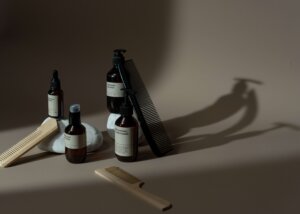What to Look For

Protein is an essential component for healthy hair growth and strength. Insufficient protein intake or poor protein absorption can lead to protein deficiency, which can manifest in various ways throughout the body, including the hair. In this blog post, we will explore the signs and symptoms of protein deficiency specifically related to hair health. Understanding these indicators will help you identify if your hair issues are related to protein deficiency and take necessary steps to address them.
1. Excessive Hair Shedding
One of the common signs of protein deficiency in hair is excessive shedding. If you notice an increased amount of hair falling out during brushing, washing, or even just throughout the day, it could be an indication of insufficient protein intake. Protein plays a crucial role in strengthening the hair follicles, and a lack of protein can weaken the hair, leading to increased shedding.
2. Brittle and Weak Hair
Protein deficiency can cause the hair to become brittle and weak. If your hair feels dry, lacks elasticity, and breaks easily, it could be a sign of insufficient protein. Protein provides structure and strength to the hair shaft, and without an adequate supply, the hair becomes more prone to damage and breakage.
3. Slow Hair Growth
Protein is essential for promoting hair growth. If you notice that your hair is growing at a slower rate than usual or seems stagnant in its growth, it may be a sign of protein deficiency. Protein supports the production of new hair cells, and when there is a lack of protein, the hair growth cycle can be disrupted.
4. Changes in Hair Texture
Protein deficiency can also cause changes in the texture of your hair. It may feel rough, coarse, or straw-like. Protein is responsible for maintaining the moisture balance and smoothness of the hair. When protein levels are low, the hair can become dry, dull, and lose its natural luster.

5. Lack of Hair Elasticity
Hair with optimal protein levels exhibits good elasticity, meaning it can stretch without breaking and then return to its original shape. Protein deficiency can result in reduced hair elasticity, making the hair more susceptible to breakage. If your hair lacks bounce and resilience, it could be a sign that protein levels need to be addressed.
6. Thinning Hair
In severe cases of protein deficiency, you may notice g of the hair. Protein is essential for building and maintaining the hair follicles, and when protein levels are inadequate, the hair can become thin and sparse. If you observe noticeable thinning or a decrease inthinnin hair density, it is essential to evaluate your protein intake.
Conclusion
Recognizing the signs and symptoms of protein deficiency in hair is crucial for maintaining healthy and vibrant tresses. If you notice excessive hair shedding, brittle texture, slow growth, changes in hair texture, lack of elasticity, or thinning hair, it may be time to assess your protein intake and make necessary dietary adjustments. Incorporating protein-rich foods such as lean meats, fish, eggs, legumes, nuts, and dairy products can help replenish protein levels and promote optimal hair health. If you suspect protein deficiency, consulting with a healthcare professional or a registered dietitian can provide personalized guidance and ensure a well-balanced diet to support healthy hair growth. Remember, nourishing your hair from the inside out is key to maintaining its strength, shine, and overall beauty.

